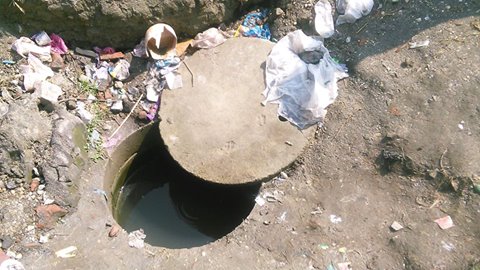
Local well at Bansighat Squatter
Living in an illegal land, residents of Bansighat squatter community is deprived of basic rights including water, sanitation and education.
There are altogether 145 households with a total population of 733 people. Majority of the residents in Bansighat community are migrant workers who are migrated in search of better livelihood. With the help of various organizations, the community has dug wells to fulfill water demand. However, after last year’s earthquake, the water sources have begun to dry leaving them to face water scarcity.
“A major problem of our settlement is water scarcity,” says Lal Dhoj Lama, a member of Bansighat squatter community. Citing that the well began to dry soon after the earthquake, he says, “The well was one of the major sources of water for us. We are totally relying upon the well for all our water needs. But now it has limited water not enough for every community people. Therefore, we have started to fetch water from another nearby well which has comparatively polluted.” Some community dwellers including Lama have been buying water from private water suppliers. Though paying high price; they complain about not getting sufficient water. “A thousand rupees means a lot for people living in Bansighat. But, even though we pay Rs 1,200 for water, we are not getting it,” Lama says in distress. “According to the water supply company, they are unable to provide us water in time as the water sources has also began to dry due to late monsoon this year,” says Lama.
With the dry season every year the valley suffers water crisis. Due to over exploitation of underground water and lack of recharge to source, the water from well has dried up in most of the areas.
Lama has five family members with a daily water demand of at least 20 liters. They have been fetching water daily from well which takes around an hour if there is queue. “We have to compromise our work and are occupied in fetching water,” he further adds. Taking about drinking, some of the community dwellers either buy water from jar, while most of other filters the water with the help of a thin cloth. “Few years back, there were not many issues. The population was comparatively less and we even used to collect rain water which would fulfill the demand of community people,” he explains.
Another resident Meena Shrestha is a housewife. She has been buying water to meet the water demand of her family. She complains that even after paying almost Rs. 1200 per month, she is unable to get water (drinking water) timely. The settlement comprises of mostly low earning group of people. Belonging from a poor community, they cannot afford to install any modern technologies. Lama believes that, if the water issues of the community are not addressed soon, their survival might be very difficult. Therefore, he strongly urges for extending help from various organizations so that they could cope with the situation.
By Uzabi Baidar, GUTHI

